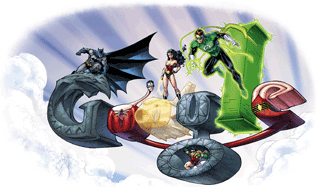 We are used to the Recording Industry Association of America aggressively litigating against individuals and organizations, trying to impede copyright infringements of musical works through peer-to-peer networks and/or other file-sharing technologies. The original Napster was converted to a pay-based music subscription service years ago and, more recently, Kazaa did the same.
We are used to the Recording Industry Association of America aggressively litigating against individuals and organizations, trying to impede copyright infringements of musical works through peer-to-peer networks and/or other file-sharing technologies. The original Napster was converted to a pay-based music subscription service years ago and, more recently, Kazaa did the same.
In light of the heated litigation in the music distribution industry, it was not surprising, by analogy, that Google quickly caught the attention of the Author’s Guild (AG) and Association of American Publishers (AAP) when Google started a massive book-scanning initiative and made the content electronically available over the Web. This project, known as the Google Library Project (sometimes referred to as “Google Book Search” and formerly known as “Google Print”) led to numerous lawsuits soon after its inception. After fighting for a few of years over copyright issues, Google reached a preliminary settlement with the AG and AAP for $125 million and also by establishing a royalty registry.
The preliminary settlement has already caught the attention of numerous critics, including the U.S. Department of Justice (DOJ). The DOJ was inundated with public comments, questioning whether the settlement would give Google monopolistic rights to distribute, for example, numerous out-of-print books. The DOJ has not formally opposed the settlement, but has started investigating what effects the settlement may have on competition.
A few days ago, public scrutiny of the terms of the Google Library Project preliminary settlement was extended beyond the U.S. borders. The European Commission (EC) is proactively requesting comments from European Union (EU) authors and publishers, arranging a meeting between EC representatives and EU authors and publishers early in the fall. During that meeting, the EC hopes to discuss the terms of the preliminary settlement, presumably to evaluate how an analogous settlement in the EU might impact copyrights, as well as antitrust considerations.
Although Google’s Library Project continues to grow, there are certainly a lot of remaining issues to resolve.
 A couple of weeks ago Amazon remotely deleted two e-books off of its customers’ Kindle readers—and in one of those too-good-to-be-true moments, the books were “1984” and “Animal Farm” by George Orwell. Ars Technica and the New York Times explain what happened; the Times ran a follow-up story today. Commentary on the incident has ranged from the fervid to the apocalyptic. (An exception is Chicago’s Randy Picker.) Jack Balkin argues that “Amazon threatens many of the basic freedoms to read we have come to expect in a physical world;” Jonathan Zittrain worries that “tethered appliances” like the Kindle “are gifts to regulators,” who will exercise a “line-item veto” over passages in books they don’t like; Farhad Manjoo at Slate concludes that “Now we know what the future of book banning looks like.”
A couple of weeks ago Amazon remotely deleted two e-books off of its customers’ Kindle readers—and in one of those too-good-to-be-true moments, the books were “1984” and “Animal Farm” by George Orwell. Ars Technica and the New York Times explain what happened; the Times ran a follow-up story today. Commentary on the incident has ranged from the fervid to the apocalyptic. (An exception is Chicago’s Randy Picker.) Jack Balkin argues that “Amazon threatens many of the basic freedoms to read we have come to expect in a physical world;” Jonathan Zittrain worries that “tethered appliances” like the Kindle “are gifts to regulators,” who will exercise a “line-item veto” over passages in books they don’t like; Farhad Manjoo at Slate concludes that “Now we know what the future of book banning looks like.”
 We are used to the Recording Industry Association of America aggressively litigating against individuals and organizations, trying to impede copyright infringements of musical works through peer-to-peer networks and/or other file-sharing technologies. The original Napster was converted to a pay-based music subscription service years ago and, more recently, Kazaa did the same.
We are used to the Recording Industry Association of America aggressively litigating against individuals and organizations, trying to impede copyright infringements of musical works through peer-to-peer networks and/or other file-sharing technologies. The original Napster was converted to a pay-based music subscription service years ago and, more recently, Kazaa did the same.